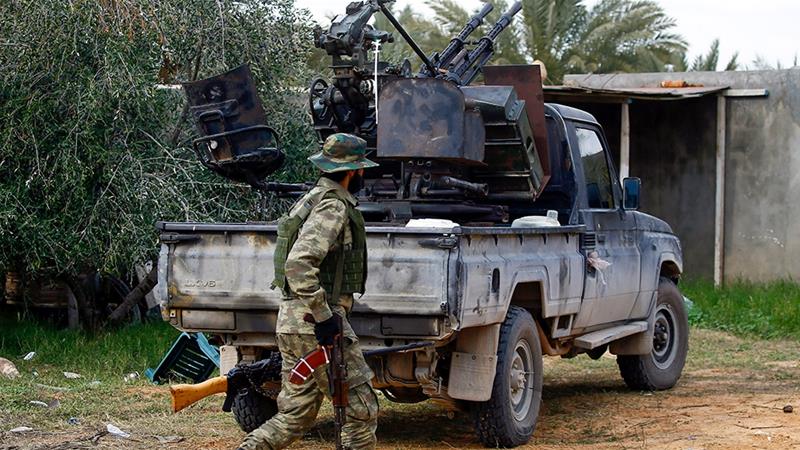
Fresh clashes in Libya despite UN ceasefire call
A new round of violence on southern outskirts of Tripoli leaves civilians dead and wounded.
A woman has been killed and four others have been wounded after forces loyal to eastern-based military commander Khalifa Haftar shelled parts of the Libyan capital, according to health officials.
Moustafa al-Mejii, a spokesperson for the UN-recognised Government of National Accord (GNA) in Tripoli, said heavy fighting broke out on Thursday when Haftar’s troops launched a renewed push to enter the capital.
More:
"Haftar's militias tried to advance in the region of Machrou al-Hadhba, but our forces repelled the attack, al-Mejii was quoted as saying by AFP news agency.
Amin al-Hachimi, a health ministry spokesperson, said the woman died after rockets fired by Haftar’s self-styled Libyan National Army (LNA) struck residential neighborhoods along the city’s southern outskirts. Four others were wounded in that attack.
Meanwhile, witnesses said they heard explosions in Machrou al-Hadhba, a largely agricultural area located some 30km (18 miles) south of the city centre.
The attack came despite a UN Security Council passing a resolution the previous day that called for a “lasting ceasefire,” in the war-wracked country. It was the first such motion to be approved since Haftar launched his assault on the GNA-controlled capital in April.
But its call for the consolidation of a fragile truce observed since January 12 has not taken effect on the ground.
Attack 'repelled'
Despite the truce, there has since been sporadic fighting almost every day near Tripoli.
Weapons have continued to flow into the country despite world leaders agreeing at a January summit to end all foreign interference in Libya and to uphold a UN arms embargo, imposed since 2011 when a NATO-backed uprising toppled longtime ruler Muammar Gaddafi.
Libya has been mired in chaos ever since, with an array of armed groups linked to rival administrations vying for power, while foreign powers continue to intervene on both sides.
Russia has been accused of sending several thousand mercenaries from a private security company to support Haftar, accusations the Kremlin denies.
Other foreign players include the United Arab Emirates (UAE), Egypt and Jordan who have bolstered Haftar, while Turkey backs the GNA.
UN chief Antonio Guterres has slammed continued foreign interference in Libya as a "scandal".
International divisions
The UNSC resolution adopted Wednesday affirmed "the need for a lasting ceasefire in Libya at the earliest opportunity, without pre-conditions".
It also called for continued negotiations by a joint military commission set up in January between the two sides, with the goal of achieving a "permanent ceasefire".
This would include a monitoring system, a separation of forces and confidence-building measures.
The commission's Geneva meeting ended Saturday without a resolution, but the UN proposed resuming talks from February 18.
The Security Council resolution, drafted by the United Kingdom, was approved by 14 votes out of 15, with Russia abstaining.
London had chosen to keep mention of the council's "concern over the growing involvement of mercenaries in Libya", terminology that had been the subject of weeks of wrangling, reflecting the deep international divisions over Libya.
Russia had pushed to replace the word "mercenaries" with "foreign terrorist fighters", but was unsuccessful.
Red Cross warning
Diplomatic efforts to contain the violence were under way on Thursday.
Italian Foreign Minister Luigi Di Maio held talks with Haftar in second city Benghazi on Thursday, Haftar's office said, a day after Di Maio met GNA head Fayez al-Sarraj in Tripoli.
Algerian President Abdelmadjid Tebboune, whose country has sought to mediate in the crisis in recent weeks, also discussed Libya with Greek Foreign Minister Nicos Dendias.
The UN says more than 1,000 people have died in the clashes between Haftar and the GNA since April, while another 140,000 have been displaced.
Human Rights Watch (HRW) on Thursday accused pro-Haftar forces of using cluster munitions in a residential area in Tripoli on December 2.
"Using cluster munitions shows reckless disregard for the safety of civilians," said Stephen Goose, the group's arms division director, in a statement.
Red Cross chief Peter Maurer warned Thursday that if the situation deteriorates, Libyans could flee the country.
"If we cannot stabilise the situation by political and humanitarian means ... there could be a population flow like we see when people lose hope," the president of the International Committee of the Red Cross told AFP news agency in Tunis.
On top of the deadly violence, Libya's National Oil Corporation has warned of a new economic crisis, saying the country's vital oil production and revenues had dropped since the Berlin conference was held on January 19.
Oil production now stood at 191,475 barrels per day (bpd) compared with 1.2 million bpd before world leaders met in Berlin, representing a loss in revenues of $1.4m, a statement said.